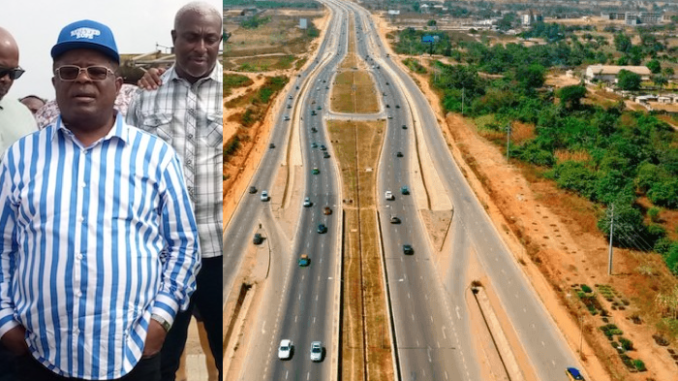
The Federal Government says it has rerouted the Lagos-Calabar Coastal Highway path to avoid any possible damage to subsea cables belonging to telecommunication companies.
The government also said it had reduced the project’s size from 10 lanes to six as a cost-saving measure for the legacy project.
The Minister of Works, David Umahi, who made the announcements at a meeting with contractors on Tuesday in Abuja, also said the government had disbursed a total sum of N10bn as compensation to property owners affected by the demolition necessary for the construction of the 700km Lagos-Calabar Coastal Highway.
This was as it announced that the first 47 kilometres of the project would be open to the public by May of next year.
The government early this year began the construction of the Lagos-Calabar highway, which is designed to extend through nine states with two spurs leading to the northern states, using concrete pavement.
It later established a committee tasked with the responsibilities of reviewing, assessing and compensating landowners affected by the construction of the expressway.
On May 1st, the government began payment of N2.75bn in compensation to property owners affected by the demolition necessary for the construction of the expressway.
Section one is scheduled to begin at Eko Atlantic and end at the Lekki deep sea port.
He said, “For the three legacy projects by the administration, the Lagos-Calabar coastal highway, we have cut down the project size to six lanes, especially from sections two, three, and four, it shows you that we mean business. Some people have been writing that we have stopped the project. No project is stopped. As we are talking now, over four kilometres of concrete road has been completed on six lanes.
“We had to establish a new path due to complaints made by MTN on its subsea cable and Okuaja community, we had to reroute not to the new alignment, not to the gazetted alignment but far away from the two, and we came back to a new alignment at kilometre 25. So the work is going and it’s moving smoothly. We have paid the total compensation of close to N10bn. we are not owing and the contractor is highly commended for a very beautiful job, commitment and being very reasonable.
“These projects are investments, and they have inherent returns on investments, By May 29, 2025, we will have completed section one of the Lagos-Calabar coastal highway. Apart from the land, we are going to acquire for tourism, factories and industries when we tow the road within 10 years we would recover the cost of the money so it is an investment.”
He added, “Sections three and four have been finalised, but we are going to do stakeholder engagement in either Cross River or Akwa Ibom because that is where those sections will get started so that we can ensure procurement. But the design is almost completed.”
Speaking further at the meeting, the minister expressed regret over the scarcity of funds, noting that the government inherited over 2,600 projects valued at N15tn.
In explaining the delay in payments to contractors, Umahi mentioned that aside from the inherited projects, the government initiated 330 emergency projects totalling N260bn.
He noted that over 80 per cent of these projects have already been completed.
He further explained that the ministry would no longer allow contractors to determine the cost of projects through the excessive use of variation of prices.
Meanwhile, the minister of works has announced that Julius Berger is expected to resume construction on the remaining section of the Abuja-Kano after resolving some challenges.
“I commend Julius Berger very highly, some of you thought we were going to be quarrelling but yesterday we resolved a lot of our issues and by this week, the Abuja-Kano work will resume.”
On the recently flooded Kara bridge, the minister stated that the issue has been rectified, ensuring there will be no further flooding.
“Also, in the next few days or weeks, we would have completed the installation of CCTV on the bridge so that we can checkmate what is happening there and we have less than 5 minutes of response time from securities agencies to avert any form of incidents,” he concluded.
END

Be the first to comment